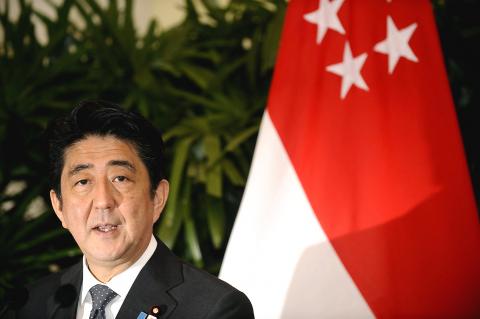Japanese Prime Minister Shinzo Abe yesterday called for a leaders’ summit or a foreign ministers’ meeting between his country and China as soon as possible, drawing a cool reaction from Beijing, which accused Japan of lacking sincerity.
Sino-Japanese ties, often fragile, have been seriously strained since September when a territorial row flared over tiny islands in the East China Sea which Taiwan also claims. Concerns that the conservative Japanese leader wants to recast Japan’s wartime history with a less apologetic tone have added to the tensions.
“I think there should be a summit meeting and also a foreign ministers meeting as soon as possible ... I think such meetings should be held without pre-conditions,” Abe said in response to a question at an academic conference in Singapore.

Photo: Reuters
China’s Ministry of Foreign Affairs said its door was always open for talks, but that the problem lay in Japan’s attitude.
“The crux of the matter at present is Japan’s unwillingness to face up to the serious problems which exist in Sino-Japan relations, and it is avoiding having earnest talks and consultations with China,” the ministry said in a statement faxed to Reuters.
Japan, it said, should “stop using empty slogans about so-called dialogue to gloss over disagreements.”
Earlier yesterday, the Japanese Defense Ministry issued a policy report repeating Japanese concerns about China’s military build-up and its activities near the islands.
The Chinese Foreign Ministry said it hoped Japan would respect the concerns of neighboring countries and “take the path of peaceful development and not artificially create and exaggerate tensions.”
The policy report called for an increase in the country’s military capabilities and a more assertive role in regional security due to increased threats from China and North Korea.
If implemented, some of the changes outlined by the interim Defense Ministry paper would be a major shift in policy for a military that is currently limited to self-defense and is banned from operating in overseas combat zones under a pacifist constitution.
The paper said Japan should increase its surveillance capability and consider using drones, or unmanned surveillance vehicles, capable of wide-range, high-altitude monitoring around the clock.
The paper also proposed creating a marine force with amphibious functions to defend disputed islands in the East China Sea. It said the Japan-US security alliance remains “the cornerstone” of Japan’s defense policy and urged Japan to step up its ability to respond to ballistic missile attacks amid concerns about North Korea’s nuclear and missile development.
A final report is expected at the end of this year.
On Friday, four ships from China’s newly formed civilian coast guard entered what Japan considers its territorial waters near the Diaoyutai Islands (釣魚台), known in Japan as the Senkaku Islands and as the Diaoyu (釣魚) in China, but left the area later without incident.
Abe also met with US Vice President Joe Biden in Singapore, after which the US restated its wish for tensions to subside.

EUROPEAN TARGETS: The planned Munich center would support TSMC’s European customers to design high-performance, energy-efficient chips, an executive said Taiwan Semiconductor Manufacturing Co (TSMC, 台積電), the world’s largest contract chipmaker, yesterday said that it plans to launch a new research-and-development (R&D) center in Munich, Germany, next quarter to assist customers with chip design. TSMC Europe president Paul de Bot made the announcement during a technology symposium in Amsterdam on Tuesday, the chipmaker said. The new Munich center would be the firm’s first chip designing center in Europe, it said. The chipmaker has set up a major R&D center at its base of operations in Hsinchu and plans to create a new one in the US to provide services for major US customers,

The Ministry of Transportation and Communications yesterday said that it would redesign the written portion of the driver’s license exam to make it more rigorous. “We hope that the exam can assess drivers’ understanding of traffic rules, particularly those who take the driver’s license test for the first time. In the past, drivers only needed to cram a book of test questions to pass the written exam,” Minister of Transportation and Communications Chen Shih-kai (陳世凱) told a news conference at the Taoyuan Motor Vehicle Office. “In the future, they would not be able to pass the test unless they study traffic regulations

‘A SURVIVAL QUESTION’: US officials have been urging the opposition KMT and TPP not to block defense spending, especially the special defense budget, an official said The US plans to ramp up weapons sales to Taiwan to a level exceeding US President Donald Trump’s first term as part of an effort to deter China as it intensifies military pressure on the nation, two US officials said on condition of anonymity. If US arms sales do accelerate, it could ease worries about the extent of Trump’s commitment to Taiwan. It would also add new friction to the tense US-China relationship. The officials said they expect US approvals for weapons sales to Taiwan over the next four years to surpass those in Trump’s first term, with one of them saying

‘COMING MENACINGLY’: The CDC advised wearing a mask when visiting hospitals or long-term care centers, on public transportation and in crowded indoor venues Hospital visits for COVID-19 last week increased by 113 percent to 41,402, the Centers for Disease Control (CDC) said yesterday, as it encouraged people to wear a mask in three public settings to prevent infection. CDC Epidemic Intelligence Center Deputy Director Lee Chia-lin (李佳琳) said weekly hospital visits for COVID-19 have been increasing for seven consecutive weeks, and 102 severe COVID-19 cases and 19 deaths were confirmed last week, both the highest weekly numbers this year. CDC physician Lee Tsung-han (李宗翰) said the youngest person hospitalized due to the disease this year was reported last week, a one-month-old baby, who does not